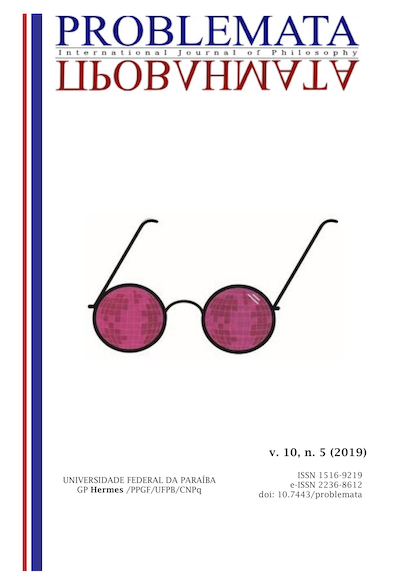IMPARTIALITY AND OBLIGATION IN THE MORAL PHILOSOPHY OF PETER SINGER
DOI:
https://doi.org/10.7443/problemata.v10i5.44974Keywords:
Impartiality, Mandatory, Supererogatory, Ethics of Fantasy, Peter SingerAbstract
This article discusses the idea of impartiality in moral philosophy. (1) First, it outlines the idea of impartiality in Singer's moral philosophy. (2) The implications of impartiality in the thesis on the obligations of the rich to help the poor are discussed. (3) Next, the distinction between mandatory and supererogatory is discussed and, from this distinction, a criticism is proposed of the agent's requirement of impartiality. (4) The criticism that impartiality would disregard self- referential altruism as a central and inalienable aspect of people's lives is analyzed. (5) Finally, we present the arguments used by Singer to respond to criticisms of impartiality: (5.1) the appeal to the Christian idea of tithe; (5.2) the idea of an intuitive level of moral thought; (5.3) the impartial justification of partiality.
Downloads
References
ARRIETA, T. Sobre el agente moral. In.: GIUSTI, M. La filosofia del siglo XX. Actas del VII Congresso Nacional de Filosofía. Pontifícia Universidad Católica del Peru: Fondo Editorial, 2000. 185-200.
BEAUCHAMP, T. L.; CHILDRESS, J. F. Princípios de Ética Biomédica. 2 ed. Tradução de Luciana Pudenzi. Loyola, 2002.
BLUM, L. Iris Murdoch and the Domain of the Moral. Philosophical Studies, 50, 1986, p. 343-367.
COTTINGHAM, J. Ethics and Impartiality. Philosophical Studies, 43, 1983, p. 83-99.
GODWIN, W. Enquiry concerning political justice and its influence on moral and happiness. Third edition corrected in two volumes. London: Printed for G. G. and J. Robinson, Paternoster-Row, 1798. V.1.
GRUEN, L. Must Utilitarians be Impartial? In: JAMIESON, D. (ed.). Singer and his critics philosophers and their critics. Oxford-Malden: Brackwell, 1999. p. 129-149.
HARE, R. M. Freedom and Reason. Oxford: Oxford University Press, 1965.
JOLLIMORE, T. Impartiality. ZALTA, E. N. (ed). The Stanford Encyclopedia of Philosophy. Spring, 2014. Disponível em: http://plato.stanford.edu/archives/spr2014/entries/impartiality Acessado em 21/03/2014.
MACKIE, J. L. Ética: la invención de lo bueno y lo malo. Traducción de Tomás Fernandez Aúz. Barcelona: Gedisa, 2000.
MULGAN, T. Utilitarismo. Tradução de Fábio Creder. Petrópolis: Vozes, 2012.
NAGEL, T. Igualdad y parcialidad. Bases éticas de la teoría política. Traducción de José F. A. Álvarez. Barcelona-Buenos Aires-México: Paidos, 1996.
PLATO. Euthyphro. In.: PLATO. Complete Work. Edited, with Introduction and Notes, by John M. Cooper. Associate Editor D. S. Hutchinson. Indianapolis-Cambridge: Hackett Publishing Company, 1997.
POPPER, K. R. A sociedade aberta e seus inimigos. Tomo I: O fascínio de Platão. Tradução de Milton Amado. Belo Horizonte: Itatiaia – São Pulo: EdUSP, 1974.
SIDGWICK, H. The Methods of Ethics. Seventh edition. London-NewYork: MacMillam, 1907.
SINGER, P. A response. In: JAMIESON, D. (ed.). Singer and his critics philosophers and their critics. Oxford-Malden: Brackwell, 1999. p. 269-335.
______. Como havemos de viver: a ética numa época de individualismo. Trad. Fátima St. Aubyn. Lisboa: Dinalivro, 2006a. (CHV)
______. Ética Prática. 3° Ed. Trad. J. L. Camargo. São Paulo: Martins Fontes, 2006b. (EP)
______. Hambre, opulencia y moralidad. In: SINGER, P. Desacralizar la Vida Humana. Introducción e edición de Helga Kuhse. Madrid: Cátedra, 2003j. p. 189-203.
______. CANNOLD, L; KUHSE, H. William Godwin y la defensa de la ética imparcialista. In: SINGER, P. Desacralizar la Vida Humana. Introducción e edición de Helga Kuhse. Madrid: Cátedra, 2003k. p. 204-229.
MILL, J. S. Utilitarismo. Tradução, introdução e notas de Pedro Galvão. Porto (Portugal): Porto Editores, 2005.
URMSOM, J. Saints and Heros. In.: WOOD, A. Essays in Moral Philosophy. Seattle: University of Washington Press, 1958. p. 196-216.
Downloads
Published
Issue
Section
License
Authors who publish with this journal agree to the following terms:
- Authors retain copyright and grant the journal right of first publication with the work simultaneously licensed under a Creative Commons Attribution License that allows others to share the work with an acknowledgement of the work's authorship and initial publication in this journal.
- Authors are able to enter into separate, additional contractual arrangements for the non-exclusive distribution of the journal's published version of the work (e.g., post it to an institutional repository or publish it in a book), with an acknowledgement of its initial publication in this journal.
-
- Authors are permitted and encouraged to post their work online (e.g., in institutional repositories or on their website) prior to and during the submission process, as it can lead to productive exchanges, as well as earlier and greater citation of published work (See The Effect of Open Access).





